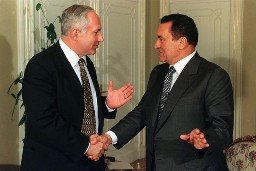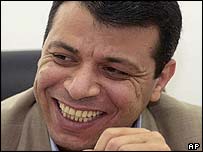 As the pope visits Israel this week, Bibi Netanyahu has more important business to attend to. His trip to Egypt for talks with President Hosni Mubarak today reflects the realigning of the Arab world and their shared concerns over Iran. The phrase 'Our enemy's enemy is our friend', never rang more true.
As the pope visits Israel this week, Bibi Netanyahu has more important business to attend to. His trip to Egypt for talks with President Hosni Mubarak today reflects the realigning of the Arab world and their shared concerns over Iran. The phrase 'Our enemy's enemy is our friend', never rang more true.Next week, Bibi is scheduled for his first visit to Washington since he became Prime Minsiter. He will be looking to show Barack Obama that there is more common ground between the Israelis and the Arabs than one might expect - the main part being their concerns over Iran. If he can show Mr.Obama that he has already got arguably the most powerful state in the Arab world, Egypt, on his side then he will be half way there.
But he is not just stopping at Egypt. Before Washington's trip comes Bibi is also in line to meet with King Abdulla of Jordan, who has also been busy rallying support amongst the Arab world, most notably Syria, to joining Jordan, Egypt and other pro-western arabic states in their alliance against Iran. Although the rewards for Syria to leave the grasp of Iranian influence, the pressures to maintain the status quo are also immense.
 Israel relationship with Egypt is the cornerstone of the Middle East Peace process. Since their agreement in 1979, the connection has been strained and cold but despite several attempts to destabalise it, it has remained strong and symbolic of the hope that is possible in the region. The relationship has found itself strengthed in recent years thanks to two factors that have created common ground with Israel's worries: 1) The meddling activities of Iran in Arab politics as it scrambles to become the major power in the Middle East by striving for nuclear capability and 2) Iranian backed-Hamas's extremism in Gaza which lead to Operation Cast Lead in January of this year.
Israel relationship with Egypt is the cornerstone of the Middle East Peace process. Since their agreement in 1979, the connection has been strained and cold but despite several attempts to destabalise it, it has remained strong and symbolic of the hope that is possible in the region. The relationship has found itself strengthed in recent years thanks to two factors that have created common ground with Israel's worries: 1) The meddling activities of Iran in Arab politics as it scrambles to become the major power in the Middle East by striving for nuclear capability and 2) Iranian backed-Hamas's extremism in Gaza which lead to Operation Cast Lead in January of this year.During the war the schisms revealed in the Arab world have never been bigger. Mubarak recalled Egypt's diplomatic envoy from Iran and publicly announced that Iran was trying to swallow up the Arab states, and Hezbollah leader Hassan Nasrallah called on the Egyptian military and populace to bring down the Mubarak regime. Rhetoric of this kind is highly unusual in the Arab world, and led to a furious response in the Egyptian media, in which Nasrallah was lambasted for his statements and mocked for the fact that he has lived in hiding since the 2006 war with Israel.
Since the end of the Gaza War, Egypt has been struggling to control the weapons smuggling that Iran and Hezbollah have been carrying out in order to undermine Mubarak's government. From the IAF raid on an arms network running from Iran, via the Persian Gulf and Yemen to Sudan, Egypt, and finally, Hamas-ruled Gaza to the uncovering of a terroist Hezbollah cell in Egypt that was planning a series of attack on Egyptian soil, indicating that Iran had selected this arab state as a target for future attacks. All this means that Egypt is open for talks with Israel on how they can show a united front when meeting with the US President later this month.
But this is as far as it goes for now. Egypt will still be conscious of its 'obligations' to the Palestinians and its role as mediator in the peace process. As he will be going with PA President, Mahmoud Abbas, he will not want the atmosphere to be too awkward by having become closer with Abbas's enemy, Israel, for the Israeli-Palestinian peace process is still a major issue that keeps the Israeli-Egyptian relationship cold and is needing another push to be resolved. But with King Abdullah wanting to push forward a new plan and a renewal of talks between Israel and Syria, Israel and the Plaestinians and Israel and the 57 Arab States, there is a lot going on and only time will tell if the various plans will be successful in achieving their aims. Read more...



















